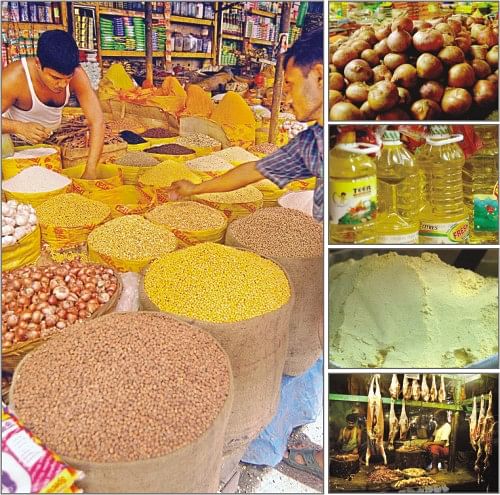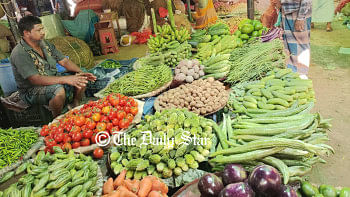Consumers gasp with worry as Ramadan nears

Photo: STAR
City dwellers have already started experiencing the sizzle of the market with prices of Ramadan items and other essentials going up only a week ahead of the holy month.
The prices of Ramadan essentials started galloping since Shab-e-Barat, adding extra burden on kitchen costs. Consumers, especially belonging to the low-income group, suffer heavily because of the hike as a never-ending vicious cycle of price escalation has pushed a large number of items beyond the purchasing capacity of the common man.
Prices of the most common iftar items like gram, peas, puffed rice (Muri), flattened rice (Chira) and dates have already gone up.
Chickpeas vastly consumed during Ramadan cost Tk 80 a kg, which was only Tk 65 a week ago while soybean oil costs Tk 85 a litre, which was Tk 65 a month back. Lentil now sells at Tk 68 a kg, onion Tk 30, garlic Tk 60 and ginger Tk 48.
Other necessary items such as beshon (powdered pulses) sells at Tk 45 per kg. A jar of 750gm Tang orange drink costs Tk 210, which was Tk 160 a year ago.
One kilogram of chilli powder costs Tk 200, which was Tk 160 only 2 to 3 week ago while cumin seeds price went up by 25 to 30 percent and now sells at Tk 300.
The price of ordinary dates marked a sharp rise to reach Tk 100 per kg. Potato is now selling at Tk 20, puffed rice Tk 38 and flour Tk 68 per kg.
For a can of 450gm ghee and butter oil one must spend around Tk 250 to Tk 305. The price of the most popular brand of milk powder is around Tk 400 to Tk 415 per kg.
Broiler chicken is now selling at Tk 105 and local breed Tk 180 per kg. However, eggplant is still affordable this year. It costs Tk 25 a kg. Cucumber is now selling at Tk 30.
Fruits became luxury for the poor a long time ago. Now they cannot even dream about it. Banana used to be the cheapest source of nutrition. A good size banana now sells at Tk 4. Price of one kg apple is Tk 120 to Tk 140 while grapes cost Tk 210. Poor man's apple guava is also out of their reach. A moderate piece of this fruit now cost Tk 5.
The common people see no respite from the spiralling price hike. "Ramadan and price hike of essentials are synonymous in Bangladesh," said a retired banker from Mirpur.
"Every year me and my wife discuss whether we will survive this Ramadan. But never in my lifetime I have experienced anything quite like this," he added.
"Price of everything keeps going up all through the year. Only the Almighty knows how high it will go up during this Ramadan”, he said.
A salesman from Elephant Road said, "When two years ago price of eggplant increased up to Tk 80, beguni became the costliest iftar item. Street side iftar sellers even used papaya as replacement of eggplant. That year we did not eat beguni during iftar. The way everything is going on this year, probably all the items will become costlier."
Shaila Khandker, a homemaker from Mirpur, said, "I usually make a plan early and purchase all the essentials beforehand because the price usually rise during and right before Ramadan. This arrangement works for me as I save money".
"However this time prices are going up all through the year. It will be worse during Ramadan. Other than expenses for iftar essentials, there are regular expenditures and Eid shopping for children. What will middle class people like us do?" she added.
Housewife Ayesha Khatun at Moghbazar said she can no longer cope with the price hike and feared that she might have to curtail her iftar menu this year.
Meanwhile, restaurant owners who sell iftar every year indicate that the price of iftar items will rise too because of the continuous price hike. An iftar seller at Shahbagh said, "Last year I sold a piece of piazoo at Tk 3, beguni Tk 5, chhola Tk 10 per 50gram, jilepi Tk 60 per kg. I may have to raise the prices this year due to price hike of almost every item."
While the city dwellers feel the heat, the government has taken several steps to control the soaring market price. Recently the government withdrew 5 percent import duty on edible oil and issued instructions about reducing bank interest rate to 12 percent on import loans.
On September 3, in a meeting with the meat sellers of Dhaka, Mayor Sadeque Hossain Khoka fixed the price of various types of meat and asked them to display a price chart at the store.
The price of beef has been fixed at Tk 170, mutton Tk 200 and buffalo meat Tk 150. Butchers however, violate the order and sell meat at higher prices. Currently the price of one kg beef is Tk 180 to Tk 200, mutton Tk 220 and buffalo meat Tk 180.
In a bid to arrest price hike of essentials ahead of Ramadan, BDR opened more fair price outlets in the city. There are around 100 fair price shops now operating under the banner of 'Operation Daal Bhaat 2007' launched by BDR.
Ansar and VDP also launched around 50 retail outlets in August while a number of private firms will operate another 12 to 14 such shops during the month of Ramadan.
Chief Adviser Fakhruddin Ahmed in a meeting with business leaders on Wednesday tried to boost their confidence, assuring them of all-out help and allaying fear of any undue harassment in running their affairs.

 For all latest news, follow The Daily Star's Google News channel.
For all latest news, follow The Daily Star's Google News channel. 



Comments